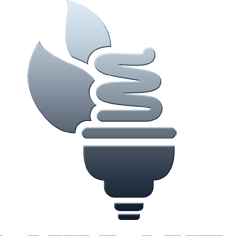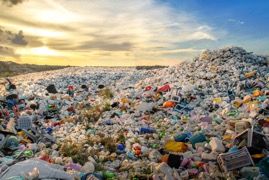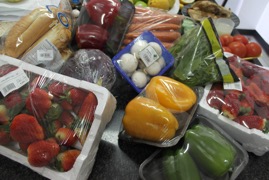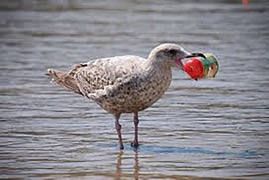Reclycling solutions for plastic waste
Modern life is unthinkable without plastic, but there's a catch. Some of the properties that make it so useful, like its low cost, light weight and durability, also make it hard to dispose of.
In the EU, instead of recycling all our plastic waste, we send a third of it straight to landfill. That's a waste of resources, and a waste of energy.
To make things worse, millions of tonnes of this waste end up in the oceans. Birds, turtles and sealife get tangled in plastic bags and abandoned fishing equipment, or they die from eating plastic debris. Over time, larger pieces of plastic break down into tiny particles called microplastic, which can form a sort of plastic soup. These particles can soak up chemical additives and endocrine disruptors, and when they are eaten and enter the food chain, they can end up on our plates.
It's a large-scale problem, and it needs a global response. Part of the answer can be found in the Sustainable Development Goals adopted by the UN, which include a target to prevent and significantly reduce marine pollution of all kinds, including marine litter. But the EU is also acting on the problem, and the Circular Economy Action Package adopted in December 2015 makes plastics a priority.
Plastic waste already needed to be collected separately, but the Package proposes raising the recycling target for plastic packaging to 55%, and reducing landfilling to no more than 10% by 2030.
Anew dedicated plastics strategy is also being prepared, to help Europe improve recycling, cut marine litter, and remove potentially dangerous chemicals. The Commission published the roadmap of the Communication on Plastics in a Circular Economy (including action on marine litter) on January 2017.
It's the first comprehensive policy response to the plastic challenge, tackling design, manufacturing, use and disposal – a truly strategic approach.
In the past 3 years, Jan de Vries projecten performed a survey how businesses can contribute & benefit locally. We found two solutions:
1. Separation technology for plastic waste, to attain 98% pure components. We focus on improving selection & separation techniques for already washed plastic feed stock.
Example of separation unit for plastic waste
2. Using plastic waste as feed stock to produce natural gas.We aim to setup units that produce 3 million m3/year natural gas quality to be injected in the main grid. The technology has been tested in a greenhouse environment.
Find out how you can participate in these projects …
In the EU, instead of recycling all our plastic waste, we send a third of it straight to landfill. That's a waste of resources, and a waste of energy.
To make things worse, millions of tonnes of this waste end up in the oceans. Birds, turtles and sealife get tangled in plastic bags and abandoned fishing equipment, or they die from eating plastic debris. Over time, larger pieces of plastic break down into tiny particles called microplastic, which can form a sort of plastic soup. These particles can soak up chemical additives and endocrine disruptors, and when they are eaten and enter the food chain, they can end up on our plates.
It's a large-scale problem, and it needs a global response. Part of the answer can be found in the Sustainable Development Goals adopted by the UN, which include a target to prevent and significantly reduce marine pollution of all kinds, including marine litter. But the EU is also acting on the problem, and the Circular Economy Action Package adopted in December 2015 makes plastics a priority.
Plastic waste already needed to be collected separately, but the Package proposes raising the recycling target for plastic packaging to 55%, and reducing landfilling to no more than 10% by 2030.
A
It's the first comprehensive policy response to the plastic challenge, tackling design, manufacturing, use and disposal – a truly strategic approach.
Local solutions
We embrace global and EU activities, but we strongly feel that local solutions must also be applied. We focus on solutions for plastic waste in our region Groningen.In the past 3 years, Jan de Vries projecten performed a survey how businesses can contribute & benefit locally. We found two solutions:
1. Separation technology for plastic waste, to attain 98% pure components. We focus on improving selection & separation techniques for already washed plastic feed stock.
Example of separation unit for plastic waste
2. Using plastic waste as feed stock to produce natural gas.We aim to setup units that produce 3 million m3/year natural gas quality to be injected in the main grid. The technology has been tested in a greenhouse environment.
Find out how you can participate in these projects …



